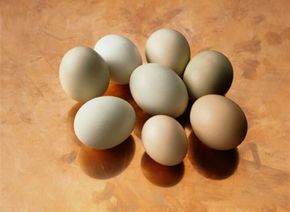Did you know that the edible part of a chicken's egg is approximately 74 per cent water, 12 per cent protein, and 11 per cent fat? Check out this list below to find out more interesting facts about this popular food product that might surprise you.
In Macedonia, an egg can mean the difference between life and death. According to local lore, if you share a birthday or even a birth month with a dying relative, your days are likewise numbered. The only way to cheat fate is to share the yolk of an egg with this relative while standing on opposite sides of a stream. Similarly, a dying man might save himself if he finds someone to share a sugared egg with him on the threshold of a house.
Advertisement
In Mergentheim, Germany, if someone falls gravely ill, that person ties a white thread around an egg and places it into a fire. If the shell turns black in the flame, death is not far off.
Swamped at work? Beset by bad luck? Craving undead company? Sneak into a Jamaican churchyard at night and visit the grave of a friend or relative--one's mother would be the most suitable. Break an egg and offer it to the deceased with some rice and rum. The ghost will rise, eat the food, and offer you help and good luck in return.
In Morocco, a woman who has a very young son and is preparing to give birth again keeps an egg close to her during labor. After the birth, the egg is given to the newborn's brother to ensure that the siblings will like each other. But if the egg should happen to be eaten by someone other than the baby's brother, the baby will grow up to hate the mother.
All across Europe, eggs are used to tell fortunes. The most popular method is to carefully pierce the shell and catch drops of the egg white in a glass of water. The shapes that form in the water are examined and interpreted by an unmarried woman who is looking for clues to her future husband's profession. A ship means marriage to a sailor, a shoe means she'll wed a cobbler, and so on.
The Scottish variant of this fortune-telling technique is called "drap glasses." A group of women get together, and each one brings an egg and hands it to the woman in charge. She then separates out the whites, drops each one into a glass of water, seals the rim with her hand, and inverts it. When everyone is done interpreting the shapes, the eggs yolks are used to bake "dumb cakes," called so because the fortune-telling is done in silence.
In rural Russia, eggs can help you make friends with supernatural forces. The house sprite (domovoi), a ubiquitous if usually invisible presence in every home, is said to occasionally assume the shape of a snake. If the owners of the house find this snake, they would do well to offer it some egg pancakes (blini). If the gift is accepted, the domovoi's benevolence is secured and the household will prosper; a rejection means the house will burn down.
Occasionally, hens lay eggs with imperfect shells or without shells altogether. In England, such eggs are traditionally called "wind eggs," from the belief that the hen laying them had been impregnated not by the rooster but by the wind. In parts of Hungary, if a black hen lays a soft-shelled egg, it is destroyed upon discovery, for it signifies the worst of omens: that the earth is softening beneath a member of the family, which is a metaphor for impending death.
Many cultures consider unusual eggs--misshapen, empty, yolkless, shell-less, or ones with the yolk and white merged--to be laid not by hens but by roosters. This belief is likely derived from the fact that the bodies of aged roosters (seven years or older) are often found to contain a white egg-shaped globule.
In 1474, legal proceedings were instituted at Basel against a rooster accused of laying an egg for purposes of witchcraft. The prosecutor pointed out that roosters' eggs were very valuable for mixing magic potions, and that Satan was known to employ witches for brooding these eggs. The magistrates were convinced, and the rooster was convicted as a sorcerer in the form of a bird and burned at the stake together with his egg.
This article was adapted from "The Book of Incredible Information," published by West Side Publishing, a division of Publications International, Ltd.
Advertisement
